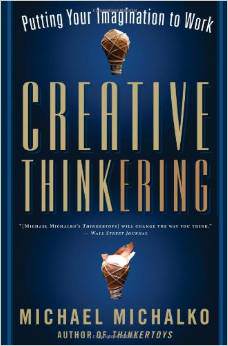How to Find Creative Ideas to Grow Your Business
Most aspiring entrepreneurs believe their initial idea and inspiration requires the most important creative thinking. Experienced entrepreneurs will tell you that the initial idea is the easy part and that it’s the implementation and marketing that are the real creative challenges.
There is a tough balance to achieve since a large portion of starting and running a business requires analytical, logical thinking. In fact, our education and training to logically associate related concepts reduce our ability to add the creative side, even though we were all born without that bias. Maybe that’s why “thinking outside the box” is so rare.
While looking for guidance on how to be more creative in growing a business, I came across Michael Michalko’s most recent book, Creative Thinkering, which clearly applies to business as well as personal environments. With his insights, I offer the following recommendations on how to nurture and build your creative business capabilities:
- Look for familiar patterns in unrelated subjects. Due to learned habits and routines, new ideas default to be similar to old ones. Creative thinkers get results by combining dissimilar subjects, like investors and competitors. I find that startups looking for funding often never even think of asking strategic partners, rather than just venture capitalists.
- Change the way you look at things and the things you look at change. Stereotyped notions block clear vision and crowd out imagination. Sometimes it’s helpful to imagine contradictory approaches, or working with opposites. Many businesses have found that raising the price of a product to give it status can win more customers than a price war.
- Think the unthinkable. We all need ways to restructure our imaginations to explore the outer limits of alternatives so that we can see beyond the typical solutions. In business, this may be as simple as replacing a product line that is still profitable, or a recent startup making a takeover bid for a large company. Creative people at Facebook are likely working on this one right now.
- Intention is the seed of creative thinking. Intention has a way of bringing to our awareness those things that our brains deem important. One way to prime for creativity is to generate an awareness of what you want to accomplish. If you study the Amazon 1-click patent long enough, you’ll likely find something of your own worth patenting.
- Change the way you speak, and you change the way you think. Many entrepreneurs focus on deficiencies, and phrase their thoughts and ideas with negatives, such as no, never, and don’t. Make a conscious decision to become a positive-thinking person by creating positive speaking patterns. Ten customer referrals are better than “no complaints.”
- You become what you pretend to be. Attitudes influence behavior, but behavior also influences attitudes. Reality has often been shown to conform to beliefs, whether they be positive or negative. In business on the Internet today, it’s easier than ever to pretend to be a large and mature company, and successful startups don’t have to pretend long.
Brainstorming, ideation, thinking outside the box, disruption, creative thinking – whatever you want to call the process of developing successful new business approaches – is something that must explore every day in your business. You have to let go of things that are holding you back, and take chances in business, especially after that first great idea.
You cannot will a new idea. But you can train your imagination, like a muscle with regular exercise, to conceptually blend dissimilar concepts from different contexts, leading to original ideas and insights. How long has it been since you have conceived and implemented a really creative idea in your business?

